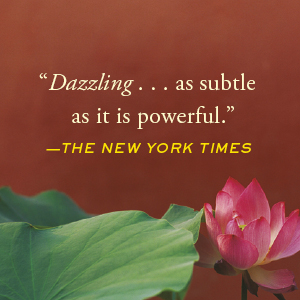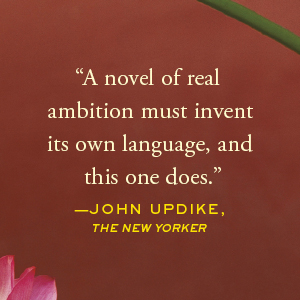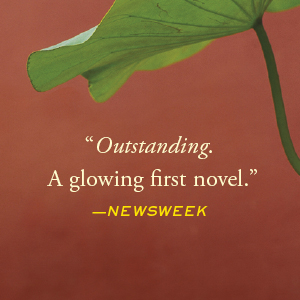Customer Services


Full description not available



K**K
Amazing writing.
Roy is one of the greatest modern authors I have ever read. This book is worth more than one reading.
G**N
AN OVER-RICH FEAST
This novel is everything that the many reviewers, both positive and negative, say it is. That's because it is overflowing with things both good and bad; it is all superabundance, superfluity and sometimes surfeit. Suzanna Arundhati Roy is a phenomenally gifted young writer simply gushing with words and perceptions, but unable to resist them, contain them, or cut them down with the cruel, revising severity of an older master. And so the reader, happy for the rich fare, but feeling a bloat coming on from the excess of sweets and carbohydrates, must pass by the later servings with some degree of displeasure. Yet, overall, it's not right to turn up your nose at a feast.The most difficult part of the repast is the beginning. THE GOD OF SMALL THINGS, following the model of Salman Rushdie's THE MOOR'S LAST SIGH, is very much a novel about family relationships. The author apparently wants the reader to enter the story in media res, as if suddenly transported to Southwestern India and stuck in a village without explanation. That device works up to a point, but beyond it precise information is needed as to who is who and how everyone is related. Roy never gives a decent accounting and seems almost spitefully to mix things up. As I read I found that I had to make a list of the characters and constantly revise it. An explanatory cast of characters should appear at the front of the book, but since it does not I think the best service I can provide to prospective readers is to offer my list. It is based mostly on early information, so does not give the story away:SETTING: the Hindu village of Ayemenem (not on maps), near Kottayam (on some maps) in the State of Kerala, which lines the southwestern tip of India; the village is two hours distant from the coastal town of Cochin (on detailed maps). The language is Malayalam.MAIN CHARACTERS:Soshamma Mammachi--the grandmother, owns a pickle factory called "Paradise."Papachi--the grandfather, 17 years older, a retired government entomologist.Ammu--daughter of Mammachi and Papachi, mother of the twins, divorced from Baba, 27 years old in 1969.Baba--the alcoholic father, goes to work in Calcutta and takes his son Estha with him; then 23 years later returns him to Ayemenem and moves to Australia.Estha (Esthappen Yako)--their son, first of the dizygotic twins, born November 1962.Rahel--their daughter, second of the dizygotic twins by 18 minutes; she marries and divorces the architect Larry McCaslin and returns to Ayemenem from America when she learns that Estha has returned.Chako--only son of Mammachi and Papachi, brother of Ammu, uncle of the twins, a Rhodes scholar at Oxford.Margaret Kochamma--English ex-wife of Chako.Sophie Mol--their daughter, dead at 9, cousin to the twins.Velutha ("white")--son of Vellya Paapen, born 1945, a Paravan (untouchable), handyman and carpenter.Baby Kochamma (Navomi Ipe)--sister of Papachi, grand aunt of the twins, once a Roman Catholic nun (not related to Margaret Kochamma).E. John Ipe--her father, blessed as a boy by the Patriarch of Antioch, head of the Syrian Christian Church.Kochin Maria--her midget maid.The above list gives dates and ages as the author provides them, but try as you might it is awfully hard to determine exactly what are the years of the two main planes of action. The author likes to shift from one to the other, so that a sense of timelessness is created, but once certain dates are given it is irritating not to have the chief ones, and one cannot escape the feeling that the author is being intentionally obscure. Possibly she could write the whole thing in Malayalam and the Malayalam reader would grasp everything, but if the medium is English then some concessions to the wider foreign culture should be made.As for the feast, nearly every idea of consequence is compared to something else, and not one simile will do, when two or three can be found. The memory of Sophie Mol, for example, becomes ever-present, like “a quiet thing in socks... like a fruit in season... as permanent as a government job.” These multiple comparisons, however fresh, are added to a text already stuffed with colors, tastes and quirky associations. Once a brilliant image is discovered, it is not used once, or even a few times, but is repeated incessantly to the end, as, for example, the trick of describing a character, say Ammu, as “an Ammu-shaped hole in the universe.” Eventually everybody becomes an X-shaped hole in the universe. And the little verbal habits, chatter and jingles of the characters, such as the childish “dum dum” added at the end of a thought, delightful at the start, become cloying and sickening by the end.There is a problem with names. Roy never gives the last names of characters, but sometimes gives Indian (presumably Malayalam) designations or terms in their stead. Thus the mother of the story is called Ammu, and her children call her “Ammu,” but so does everyone else. Evidently she is just generally Mother, and we never get a first or last name. (Or I got it wrong.) Similarly “Chako” appears to mean “uncle,” yet other characters seem to call the man by this name, while the kids are forbidden to do so. Readers of English would expect the characters called Baby Kochamma and Margaret Kochamma to be related, but they are not: the first is an old Indian; the second is a young Englishwoman who married into the family. “Kochamma,” then, must indicate a status (non-Hindu, non- Muslim?) which is never explained. Or is it a last name? Similarly “Mol” is added on occasion to the name of a girl and “Mon” to the name of a boy, without explanationAll the same, there are wonderful things here. Roy, being fearless, lapses on occasion into bad taste, revoltingly bad taste, but in her best moments achieves a sublime portrayal of life as severe and unsparing as Joseph Conrad. The reader inclined by her child's-point-of-view narrative to place all good in childhood and all evil in maturity should reflect on a little scene in which two girls are stepping on ants: one wants to kill them all, but the other wants to leave one so "it will be lonely." Here, as in other scenes, is the remorseless eye of a great artist.
I**M
Everything out of the ordinary.
It's ten-to-two.It's ten-to-two on Rahel's painted watch.It’s ten-to-two on Rahel’s painted watch which lies under the revolved earth of The History House in the Heart of the Darkness.It’ll be always ten-to-two on the stillness of Roy’s book as the derailed freight train of her story slams into our hearts.It’ll be always ten-to-two when Sorrow, Pain, Unrequited Love, Too Much Love, and Unbearable, yet Understandable, Truths of Life collapse from their wagons and bury us all under them;It’ll be always ten-to-two as the train’s sharp wheels scar our souls as deep as the ugly scars on Mammachi’s head, her blind soul carefully hidden by the gray hair and they will be there forever, for us to carry.Ours will be beautiful scars.Scars… Healed scars. Scars healed by Unbearable Forbidden Necessary Cleaning Love, which will always be able to follow the Music escaping from a tangerine radio as it floats in the Air.The Still Air of Life.The Air of Roy’s story is filled with the haunting Truths of Life, so heavy to carry, they need to be shared, breathed by the twins, Esthappen, the boy-man, and Rahel, the girl-woman, as One. They are so horrible to be spoken of, that Rahel’s eyes becomes empty, empty with everything and Estha stops speaking, speaking with all. Inside.But the Truths of Life leak as Mammachi’s Pickles’ bottles have leaked, impossible to be tamed into perfection, silent as a mute shriek of grief, imperceptible as a light cutting deep into darkness.As History evolves and revolves as the round World we live in, the skyblue old Plymouth, with its painted rack falling apart, thunders the careening story of Life and Death.Life and Death. Love and Hate. Angels and Demons. Humans and Beasts. Happiness and Rules. The Big Things and The Small Things, which in a reversal of their inherent nature belonged to the Small light God, who sweeps clean his steps as he walks backward, and the Big powerful God (god?), who stomps into the House with his dirty, muddied boots.Roy leads us past glass of pickles and jellies of Paradise Pickles & Preserves, the factory; past The Sound of Music, the film; and past childhood, marriage, madness, pedophilia, poverty, violence, injustice and betrayal. And love, so much love.With no mercy, she tows us past the lost, hidden beauties and still there horrors of India; past confused Indians, immersed in caste hierarchy and lost in the war between British Imperialism and Karl Marx Communism; forced Evangelism; past Elvis Presley, Oxford, Coca-Cola, American TV shows and London life; all preferred, favorites in spite of the unique, laid-to-waste-in-twenty-minutes Kathakali dance.And she dresses us in saris of intolerance sewed carefully by single, married and widowed women and she gives us the painted masks of their unavailable, chauvinist kinsmen.For us, she disrobes the once-one turned-lonely children and two couples of forbidden lovers - who had already been bared, robbed… Loved less… The four of them The Gods of Small Things.And she makes us watch the Terror and the Love.I read this in two seatings only because I had to get a couple of hours’ sleep. I was frozen in my armchair, fossilized in time by the unjustified justice of my few smiles and many tears; nerves uncapped, shaking, almost hiding, as I saw many of my thoughts being SHOUTED OUT LOUD at me, from me.Will I read it again? Yes. Later. (Lay. Ter.)Now, I need a moment. Of quiet emptiness.To rage.Et tu, English, Indians, Christians, Syrian Christians, Hindus, Pelaya, Pulaya, Paravan, Touchables and Untouchables, Lower Middle Upper Classes, No Classes, all-and-yet-never Comrades! Who saw and looked away!Et tu, Sophie Mol! The unfortunate English child killed-killer of the simple happiness of Rahel's and Estha’s childhood, the two-egg twin that was only One.Et tu, Pappachi, the Imperial Entomologist, domestic abuser, proud and full of cruel, ugly moths; Mammachi, the almost-blind beaten-wife and example of Christian beatitude; Vellya Paapen, the one with a mortgaged glass eye and the real blind one; Baby grand aunt Kochamma, the gullible girl turned bitter-sour, with her perfect Per-Nun-Ciation and unfair, hasty judgements and psychologic torture! Who played alone-along their parts, ignorantly not knowing life was no rehearsal!Et tu, poor Rahel and Estha! Children so loved less, from the Beginning until the End, the only one, forever un-living-dead bearers’ of short sad lives and long alive deaths, who didn't know how to do otherwise.Et tu, All-of-Us! Who are rehearsing the Play and making Black Holes in the Universe, while out-of-our-minds, we count our Keys, looking into the void-avoiding the smelly injustice being distributed!What it worth it? The price to pay for a forbidden love?Yes. Maybe. I don’t know.I will need to read it again. Later.Now, I need a moment. Of empty quietness.To Praise.To Love.But no words of mine would do justice to Roy’s work of art, so leave me here, hurting and loving, stabbed in the back by my own hand with the Truths of my your our Life, accepting a bit more of myself you this world, and read this real, poetic, sad, grand, too-small-to-be-contained Book.And the Kathakali dancers danced and their drummers drummed, to ask pardon of their Gods, as we also should do for the daily, unconscious murder of our Gods of Small Things.While it’s ten-to-two.Before it’s too late…———————————————————————In the light of my last review of another book, where I closed its ebook covers at 20% because of typos, missing commas, too-many-grand-long-forgotten words and foreign mottos written wrongly, loose-lost opinions about historical facts, and over-the-top “'pumpkin bums’ descriptions of nothing-happening-to-many-characters-that-had-nothing-to-do-with-any-one”, I think that to be fair to those who read my reviews, I owe an explanation to my 5 star rating for ‘The God of Small Things’.Roy took me through the creation and death of an ornamental garden; made me sat in a church filled with ants, a baby bat and a dead child.I traveled in a bluesky Plymouth on a road full of frog stains while she uses foreign words, many half-full sentences, repeated ideas and (over-the-top, some will say) analogies. I consulted the dictionary more than a couple of times, as English is not my mother language and she uses words I was not familiar with (Probably, I would have to consult the Portuguese dictionary too).She made me wait, as a pregnant woman waits, as I read story upon story of many different characters, who seemed to have nothing to do with Rahel and Estha or anyone else, but were all linked somehow by society and social relationships.Yes, this book could have been smaller, but it could have been bigger. But if it were different, then it wouldn’t be ‘The God of Small Things’.I didn’t closed the book at 20% and I rated her work 5 stars.Why?Because.Because there are books and books; authors and authors.Because I don’t care if another author has used a style before Roy used it. I don’t care if there is another author who does it better than she did it. What readers and reviewers sometimes don’t understand is that gifted authors are often gifted-avid-readers, with screaming souls begging to be set free; who drown in the works they have read and let them soak in and soothe their pains. These authors are allowed to use all the styles as their own, without being accused of stealing them, as I’ve seen a few reviewers raging about. And I tell you that as an avid reader with a newly-freed author’s soul, hoping to be one day as gifted as Roy.Because what I care is that, in Roy’s work, there are magical, complex, centuries of old-untold relationships to be read about, learned and admired, in the middle of the marvel unseemly-going-nowhere descriptions of a ripple fruit bursting and an orange sun setting.Because Roy’s Universe is raw and rough, a few times sweet, filled with her beautiful, sharp-edged opinions - that some may think prejudiced - but are historically based and lived. She tells us an Indian story that could have been a Brazilian story. My story. Your story.Because what I care is that, without asking my permission, Roy took my soul and gave it back; Sadder for a moment, but more knowledgeable and fuller of passion.Because this is not a book for everyone, but for those who live life on its full, and are grateful for the possibility that, even being of die-able age, they are still alive; for those who are interested in relationships and its octopus sucking tentacles; for those who are mindful of how cruel the world can be and yet are able to see the beauty of a sunset and a strict forbidden incest love told in poetical, not-rhymed words; for those who can stand up for others in need.For those who love.“Because Anything can Happen to Anyone.It’s Best to be Prepared.”Arundhati Roy, in The God of Small Things———————————————————————P.S. 1 - If in your ebook you stumble upon lost inverted commas, dizzy dashes and en-dashes, overlook them. They are just simple typos - perhaps there on purpose, who knows?This book is like a child or a loved-lover, who should never be loved less, for his perchance carelessness, because it belongs to the Universe of Rippling Truths of Life.
J**Y
Expensive Convenience
Yes it was a new book and in great condition. Plus it took no time getting to me. But I ended up having to pay more than a bestselling hardback for the paperback I ordered.However, this was the only place I could find the book easily and very quickly. Was the convenience worth the price? I can only say that it really depends on one's perspective.At the time I was working on a project and needed the book a.s.a.p. and started reading it.*Note: I had the book and lent it to a friend a couple of years ago. I first read it as required reading for a class and loved the book. It consequentially became one of my all-time favorite books and I have read it many times but not in years. I knew I'd get the book back faster by just buying it again rather than asking the friend for the book back. I leave it as a gift of wondrous reading.*But then crisis happened and priorities had to be changed. I still haven't finished the book. So in hindsight, I could have probably taken the time and patience to find the book cheaper elsewhere or even spent more time looking on Amazon.But my rating stands because it was just ridiculously expensive in my opinion. It is a paperback. It should not cost what I paid for it.I'm disabled. The computer is all I have to make an income and I have too much work to do. I don't always have time for all of that kind of research anymore as my work increases. I have a very tight budget in order work and even paying a dollar more than I think something should sell for makes a huge difference in my ability to support myself.-the end
Trustpilot
1 month ago
2 months ago